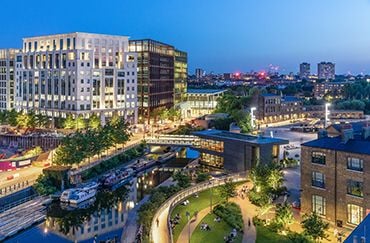Making Meaningful Cities
Dr Ruth Yeoman is researching what makes living and working in cities meaningful for citizens – and working with companies and organisations to apply this to investment policy and development practice.
‘The idea of meaningful cities goes beyond that of sustainable cities built on technical solutions,’ explains Dr Yeoman. ‘It considers issues of rights, justice and the common good – and the lives and voices of urban dwellers should be at the heart of it. Crucially, citizens are invited not just to participate but to be involved in decision making in ways that allow them to flourish in cities.’
Dr Yeoman’s meaningful cities concept grew out of her research on meaning in work and organisations. Workers transform their relationship with work when they feel they are contributing to a larger purpose, such as patient care or sustainability. City dwellers who create and manage economic, social or cultural projects feel more at home, and more connected to place and people, and this gives meaning to their lives and activities.
With funding from the University of Tampere, Dr Yeoman has worked with Oxford’s Dr Marc Thompson to explore the concept of meaningfulness in six Finnish cities. Further funding from Hermes Investment Management allowed her to apply the concept of meaningful cities to their King’s Cross Development.
For Hermes, the research provides insights into the environmental, social and governance (ESG) dimensions of their long-term vision for King’s Cross, and similar developments. Invested in King’s Cross are important sources of meaning – inclusion, culture and heritage, innovation, growth and diversity – that residents, community groups, corporate tenants and other stakeholders identified as contributing to meaningful lives and work.
Interviews picked up that residents in nearby neighbourhoods wanted to feel part of the development, particularly in terms of employment opportunities for young people and well-being for everyone. Partnerships between Argent (the property management company), corporate tenants, and community groups – for example, homework clubs and gardening initiatives – helped to overcome a sense of exclusion felt by some.
The research argued that a sustainable future for King’s Cross will depend upon bringing stakeholders’ voices into governance of the estate. Hermes Real Estate has now adopted the meaningful city concept as a way to think about sustainable property development; they have included it in the Impact Framework which guides their investments and referenced it in their 2019 Annual Report.
Dr Yeoman says: ‘Many companies are looking to go beyond efficient generation of profit to look at additional social, environment and justice outcomes. The concept of meaningful cities allows them to add a further ethical and social dimension to their business.’
‘It’s easy for academics to sit in silos,’ she continues. ‘This work takes political theory and business ethics out of the university to connect with real world practice. And it’s heartening to see that it has the potential to inspire and motivate businesses and communities to develop cities in more inclusive and socially sustainable ways.’
Dr Ruth Yeoman is a Research Fellow at Kellogg College, where she researches meaningfulness and mutuality in organisations and systems.
Funders: Hermes Investment Management; The University of Tampere, Finland; Oxford’s John Fell Fund (meaningful work); British Academy/Leverhulme (meaningful work).
